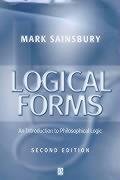
Inhaltsangabe
Logical Forms explains both the detailed problems involved in finding logical forms and also the theoretical underpinnings of philosophical logic. In this revised edition, exercises are integrated throughout the book. The result is a genuinely interactive introduction which engages the reader in developing the argument. Each chapter concludes with updated notes to guide further reading.
Die Inhaltsangabe kann sich auf eine andere Ausgabe dieses Titels beziehen.
Über die Autorin bzw. den Autor
Mark Sainsbury is Susan Stebbing Professor of Philosophy at King's College London. He is the author of Russell (1979) and Paradoxes (second edition, 1995).
Von der hinteren Coverseite
When is a reason for doing or believing something a good reason? Over the past century, logic's contribution to answering this question has typically involved finding ''logical forms": that is, using a special notation to bring out logical features more clearly. <p>The correct identification of logical forms has been held to be important not only to logic but also to philosophy. Bertrand Russell coined the phrase "philosophical logic" to describe an approach to philosophical problems: find the correct logical form of the problematic sentences, and the problems vanish. <i>Logical Forms</i> explains both the theoretical underpinnings of the approach and the detailed problems involved in finding logical forms in the languages of propositional logic, classical first order logic, modal logic, and some alternatives such as free logic, binary and substitutional quantifiers.</p> <p>This revised edition incorporates results of recent work. Chapter 3 on conditionals, and the sections dealing with predicate quantifiers, free logics and subjunctive conditionals have been completely rewritten. The exercises are integrated throughout the book, and each chapter concludes with updated notes to guide further reading. The result is a genuinely interactive introduction which engages the reader in developing the argument.</p> <p>This book does not presuppose knowledge of deductive methods in formal logic and it will be of immense benefit to those approaching philosophical logic for the first time.</p>
Aus dem Klappentext
When is a reason for doing or believing something a good reason? Over the past century, logic's contribution to answering this question has typically involved finding ''logical forms: that is, using a special notation to bring out logical features more clearly.
The correct identification of logical forms has been held to be important not only to logic but also to philosophy. Bertrand Russell coined the phrase philosophical logic to describe an approach to philosophical problems: find the correct logical form of the problematic sentences, and the problems vanish. Logical Forms explains both the theoretical underpinnings of the approach and the detailed problems involved in finding logical forms in the languages of propositional logic, classical first order logic, modal logic, and some alternatives such as free logic, binary and substitutional quantifiers.
This revised edition incorporates results of recent work. Chapter 3 on conditionals, and the sections dealing with predicate quantifiers, free logics and subjunctive conditionals have been completely rewritten. The exercises are integrated throughout the book, and each chapter concludes with updated notes to guide further reading. The result is a genuinely interactive introduction which engages the reader in developing the argument.
This book does not presuppose knowledge of deductive methods in formal logic and it will be of immense benefit to those approaching philosophical logic for the first time.
„Über diesen Titel“ kann sich auf eine andere Ausgabe dieses Titels beziehen.
Weitere beliebte Ausgaben desselben Titels
Suchergebnisse für Logical Forms: An Introduction to Philosophical Logic
Logical Forms: An Introduction to Philosophical Logic
Anbieter: Majestic Books, Hounslow, Vereinigtes Königreich
Zustand: New. pp. 432. Artikel-Nr. 7477089
Neu kaufen
Versand von Vereinigtes Königreich nach USA
Anzahl: 3 verfügbar
Logical Forms: An Introduction to Philosophical Logic Second Edition
Anbieter: Revaluation Books, Exeter, Vereinigtes Königreich
Hardcover. Zustand: Brand New. 2nd revised edition. 424 pages. 9.25x6.25x1.50 inches. In Stock. Artikel-Nr. __0631216782
Neu kaufen
Versand von Vereinigtes Königreich nach USA
Anzahl: 2 verfügbar

